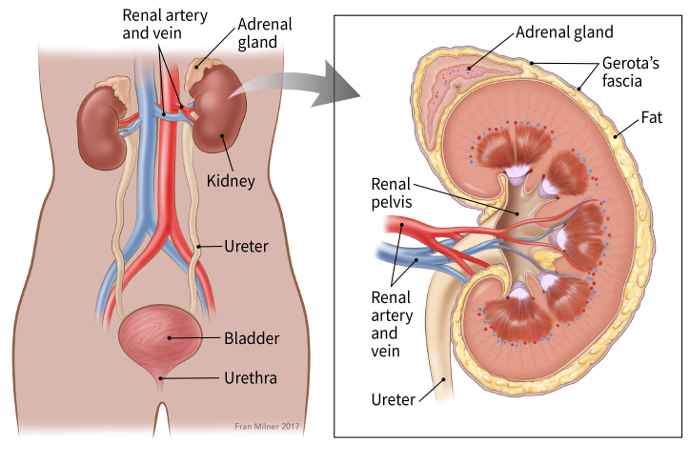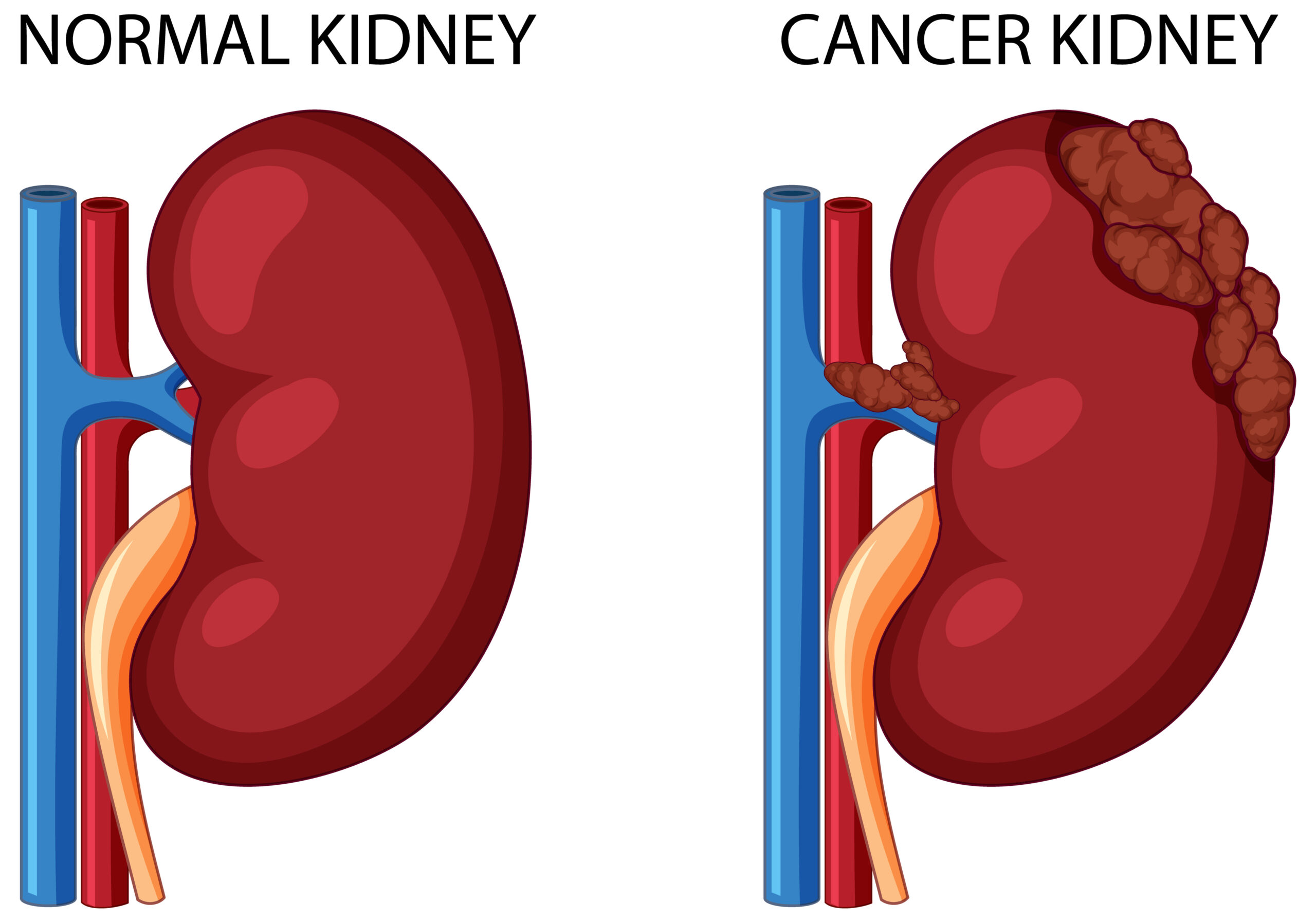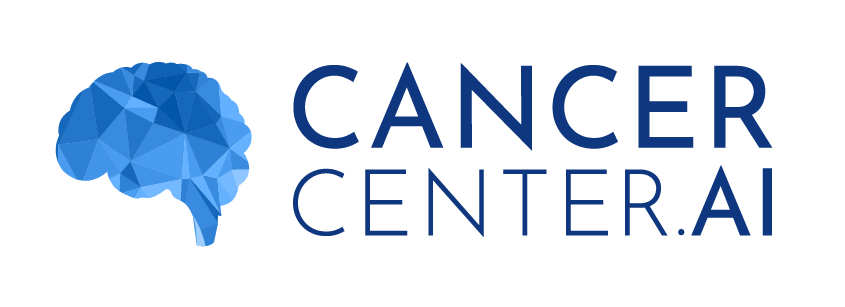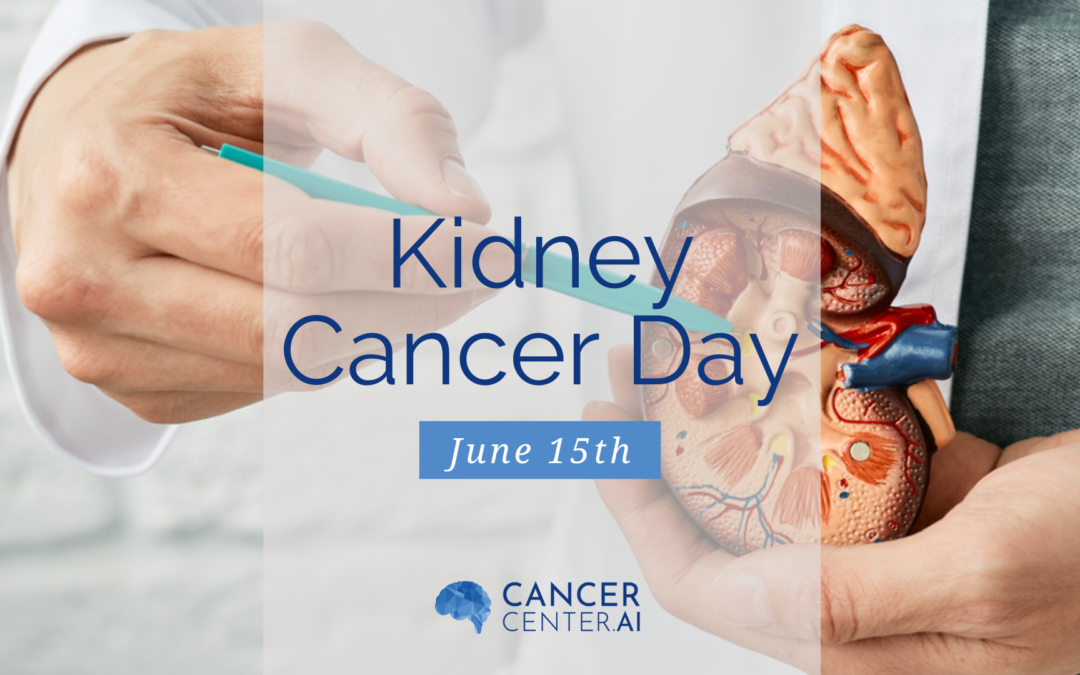Annually, World Kidney Cancer Day brings together individuals from around the globe to raise awareness about kidney health. In this article, we strive to arm you with vital knowledge about kidney cancer – understanding its symptoms, ways of self-monitoring, and possible preventative measures. Our collective efforts towards understanding and tackling kidney cancer can help save lives.
The Kidneys
The kidneys are a pair of bean-shaped organs, each about the size of a fist. They are attached to the upper back wall of the abdomen and protected by the lower rib cage. The kidneys’ main job is to remove excess water, salt, and waste products from blood coming in from the renal arteries. These substances become urine. Urine collects in the center of each kidney in an area called the renal pelvis and then leaves the kidneys through long slender tubes called ureters. The ureters lead to the bladder, where the urine is stored until you urinate. Apart from their primary function, the kidneys carry out an array of other vital tasks. They are instrumental in maintaining optimal blood pressure levels through the secretion of a hormone known as renin. Furthermore, they contribute to ensuring a sufficient count of red blood cells within the body.

Kidney Cancer: The Silent Malady
Kidney cancer, sometimes referred to as renal cancer, begins when the cells in either one or both kidneys start to grow uncontrollably, forming a tumor. The challenge with kidney cancer lies in its often asymptomatic nature in the early stages, making its early detection somewhat difficult. However, the prognosis is generally favorable when diagnosed early, underscoring the importance of regular health check-ups.

The Reality of Kidney Cancer: Numbers to Remember
Understanding the true extent of kidney cancer helps create awareness and encourages early detection. Some crucial statistics include:
- The American Cancer Society predicts that 81,800 new cases of kidney cancer will be diagnosed in the United States in 2023, with an estimated 14,890 deaths.
- Kidney cancer is more prevalent in men than women.
- Most people with kidney cancer are older. The average age of people when they are diagnosed is 64 with most people being diagnosed between ages 65 and 74. Kidney cancer is very uncommon in people younger than age 45.
- The 5-year relative survival rate for kidney cancer in the United States is 77%.

Self-Monitoring for Kidney Cancer: A Proactive Approach
Actively keeping track of your health can aid in early detection. Though self-monitoring should never replace professional medical advice, it does play a crucial role in recognizing the early warning signs. Here are some ways you can do this:
- Know the symptoms: Symptoms like blood in urine, lower back pain, loss of appetite, or unexplained weight loss could be potential warning signs. However, these symptoms may also be linked to less severe health conditions. It’s crucial to consult a healthcare provider if you experience any changes.
- Keep a health diary: Logging your symptoms can help when talking to healthcare professionals. By keeping track of symptoms over time, you can identify changes that require further investigation.
- Regular health check-ups: Regular visits to your healthcare provider can help catch any potential issues early.
Prevention: Minimizing the Risk of Kidney Cancer
Although it’s not entirely possible to prevent kidney cancer, some strategies can help reduce the risk:
- Avoid tobacco: Smoking cigarettes doubles the risk of kidney cancer. Quitting tobacco is an effective way to lower this risk.
- Keep a healthy weight: Obesity is a risk factor for kidney cancer. Regular exercise and a balanced diet can help maintain a healthy weight.
- Monitor blood pressure: Hypertension is a known risk factor for kidney cancer. Regular blood pressure checks and management can aid in prevention.
Conclusion
World Kidney Day serves as a platform for global unity in the face of kidney-related conditions, including kidney cancer. By raising awareness, promoting early detection, and advocating for preventive strategies, we can work towards a healthier future for all. Let’s unite on World Kidney Day to raise awareness, support those affected, and strive for a healthier future.
Bibliography
- American Cancer Society – https://www.cancer.org/cancer/kidney-cancer.html
- National Kidney Foundation – https://www.kidney.org/
- National Cancer Institute – https://www.cancer.gov/types/kidney
- NHS – https://www.nhs.uk/conditions/kidney-cancer/
- Kidney Cancer Association – https://www.kidneycancer.org/

